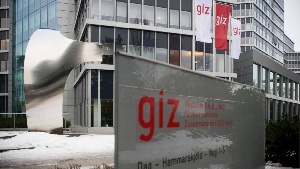 GIZ has partnered NADMO to aid smallholder farmers reduce risks in their businesses
GIZ has partnered NADMO to aid smallholder farmers reduce risks in their businesses
GIZ, a German Development Agency, in partnership with the National Disaster Management Organisation (NADMO), has rolled out a programme on preventive and risk reduction instruments for smallholder farmers in Ghana.
The programme is being piloted within communities in two identified districts in the country while lessons learnt are being integrated into national adaptation policies in Ghana as part of the sovereign disaster risk insurance.
A report made available to the Ghana News Agency by GIZ in Bonn, Germany, said the programme tallies with the Government’s commencement of the accession process to the African Risk Capacity.
The project would help strengthen the institutional capacity of NADMO and support the establishment of disaster risk management standards like contingency plans to comply with the accession criteria of the ARC-Agency.
It would also strengthen the capacity of the Ghana Agricultural Insurance Pool to develop and provide viable insurance products for commercial agricultural companies to absorb climate-related agricultural risk events.
Under sector specific climate risks, the report said context-specific Integrated Climate Risk Management concepts were being developed for various applications in several countries in the urban, transport, water and tourism sectors.
With the industry and the public sectors, it said insurance solutions and risk reductions/adaptations measures were being developed for direct and indirect impacts of extreme weather events.
The report also makes recommendations for a legal enabling environment based on the individual circumstances.
Ghana has been one of Germany’s partner countries for more than 30 years since GIZ opened an office in Accra in 1983.
Currently, GIZ has 208 employees working in Ghana including 154 local staff.
Germany regards Ghana as an outstanding example of economic and democratic development in Africa. With average annual per capita income of around 1,400 euros, Ghana had been classed as a middle-income country since 2010.
As agreed between the Governments of Germany and Ghana, GIZ’s work in the country currently focuses on the priority areas of agriculture, governance, and sustainable development.
Under agriculture, GIZ, through the Market-Oriented Agriculture Programme (MOAP), contributes to the development of value chains for maize, citrus fruits, mangoes and pineapples.
Working with major processing companies, MOAP reaches large numbers of farmers who benefit from training in good agricultural practices in areas such as tree pruning, weed control, plant protection and fertiliser use, enabling them to boost their productivity.
The GIZ also provides advisory services to Ghana’s Ministry of Food and Agriculture and supports private sector capacity building in the agricultural sphere.
Under its Governance Programme, GIZ promotes good governance and supports the Ghanaian Government’s efforts to deliver improved services for citizens.
As a basis for efficient and effective governance at the local level, GIZ is working to create reliable revenue streams, with a focus on the transparent and effective management of these financial resources.
The Sustainable Economic Development programme sees GIZ cooperating with the Ministry of Finance, the Bank of Ghana and the National Insurance Commission on improving small and medium-sized enterprises’ access to financial services and boosting employment in the financial sector.
GIZ also aims at improving vocational training and supporting the business and professional associations’ efforts to identify training needs and devise appropriate skills development programmes.
In addition, on behalf of the German Federal Ministry for Economic Cooperation and Development, GIZ provides support for the Kofi Annan International Peacekeeping Training Centre and promotes the successful implementation of the Renewable Energy Act.
Ghana is becoming increasingly important for the German economy. There are currently 12 development partnerships in Ghana involving German international and local businesses.